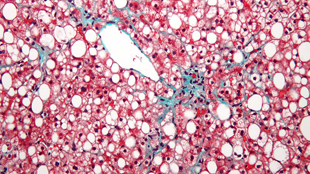 Fatty deposits (white) are scattered throughout this micrograph of a liver afflicted with non-alcoholic fatty liver disease.WIKIMEDIA, NEPHRON
Fatty deposits (white) are scattered throughout this micrograph of a liver afflicted with non-alcoholic fatty liver disease.WIKIMEDIA, NEPHRON
Obesity spurs changes in the gut microbiome that can lead to the production of DNA-damaging metabolites. And according to new research published today (June 26) in Nature, circulation of these metabolites through the gut and liver initiate inflammatory and tumor-promoting factors that make mice more susceptible to liver cancer.
“This is a fascinating set of findings,” said Peter Turnbaugh, a systems biologist at Harvard University, who did not participate in the research. “This study shows that changes to the trillions of microbes that are found in the gut in response to obesity can contribute to the formation of damaging microbial metabolites.”
Obesity has been on the rise in developed nations over the past few decades, with one third of adults in the United States considered ...













